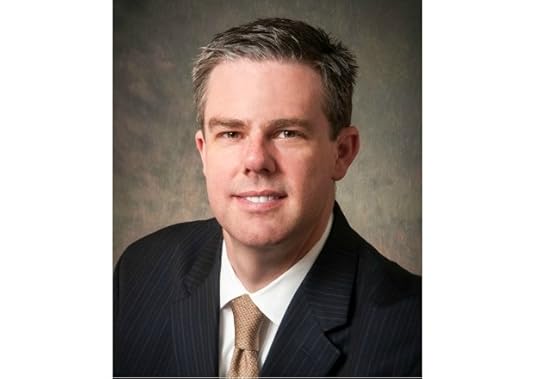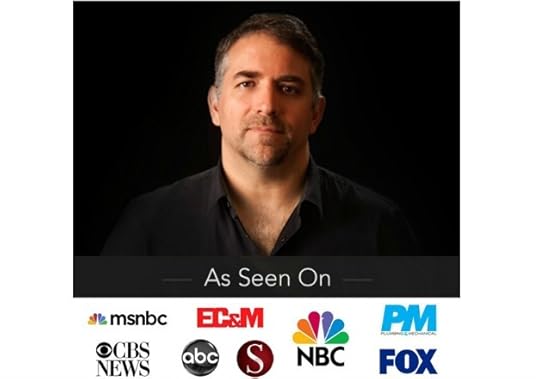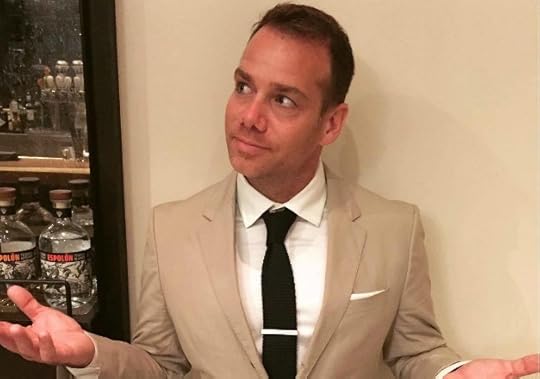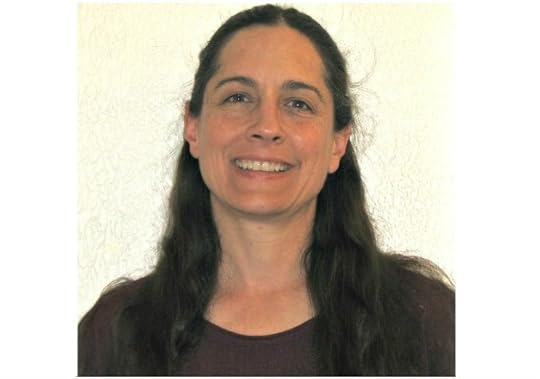Mike Michalowicz's Blog, page 70
May 6, 2016
Improve Your Business By Traveling More
When Phil Romano founded Macaroni Grill, he traveled throughout Italy to determine what made restaurants so popular. Among other things, he found that in Italy a jug of wine is simply placed on the table when the customer arrives. When they are ready to pay the bill, the waiter simply asks how many glasses of wine they drank. That’s how Macaroni Grill got off to such a successful start. Open jugs of wine. A little touch of Italian culture.
For your business to stand out, it too needs to be different. It is hard to discover different things (and have confidence that they’ll work) if you constantly stay in the same circles. It’s time for you to get out. So, I am giving you that excuse you’ve been waiting for: You need to travel more. Your business needs it.
May 5, 2016
Bank Balance Accounting
I am sure you are familiar with the terms for your business’s financial reports including the Profit & Loss Statement (also known as the Income Statement), the Balance Sheet and the Cash Flow Statement. The question is, do you know how to read them? I bet you don’t. Not really.
If you talk with your accountant, she will explain to get a real sense of your company’s financial health you need to read all three of these statements, and calculate specific metrics like your Operating Cash Ratio and your Quick Ratio. Additionally, to make sure your numbers are current, she will tell you to do this weekly. It sounds great, but it is too much to learn and way too much to do (even if it was only monthly). So what do we entrepreneurs do? We look at our bank accounts.
I am not sure when traditional accountants will figure this out, but few entrepreneurs have the time to learn and leverage these financial tools, let alone do it weekly. In fact, the whole reason we hired that accountant in the first place is so they can do all that stuff for us. We don’t have the time to do the complex stuff, so we revert to Bank Balance Accounting.
How Bank Balance Accounting works is this: We log into our bank accounts, see what the balances are and then, based upon what we see, make decisions on how to proceed. We make collection calls and sell hard when our balance is low. We invest in equipment and expansion when the balance if high. It works. Kinda.
It works, because it is how we are wired to look at quick indicators (e.g. Does my bank account have enough money or not), trust our gut and then take an action. It doesn’t work perfectly though, because it seems that we never have enough money left to pay ourselves. That’s why I created Profit First.
Profit First is designed so that you can (and should) continue doing Bank Balance Accounting. With Profit First
is designed so that you can (and should) continue doing Bank Balance Accounting. With Profit First you pre-allocate money into specific bank account (e.g. A Profit account, an Owner’s Compensation account, a Product Purchasing account, an Operating Expense account, etc.) in advance, so the next time (and every time) you log into your bank, you know exactly what the money is there for.
you pre-allocate money into specific bank account (e.g. A Profit account, an Owner’s Compensation account, a Product Purchasing account, an Operating Expense account, etc.) in advance, so the next time (and every time) you log into your bank, you know exactly what the money is there for.
But it gets better. When you login and see that you don’t have enough money in an account, you will immediately be aware of the problem. That’s when you call your accountant and have her go through those statements and ratios with you. That’s why you hired her in the first place. If you accountant doesn’t get that, maybe it is time to find a new accountant.
May 4, 2016
Episode 85: Explosion of Profit with Mike Agugliaro





Show Summary
Mike Agugliaro shares how he started a small electrical contractor/plumber business and grew it into a massive home service company that now generates more than $32 million in revenue. The secrets to his success aren’t necessarily what you’d expect… a moment of exhaustion resulted in an explosion of growth. Additionally, Mike shares insights on how he started another business for coaching that plays into his passion. By being his authentic self it attracts customers that resonate with him, growing his coaching business into a wildly profitable one in only a few years. Discover all of Mike’s secrets in Episode 85 of the Profit First Podcast!
Our Guest
For more than two decades, as the co-owner of New Jersey’s largest and respected home services company, Gold Medal Service, Mike has played a key role in building Gold Medal’s success. In the last 10 years, Mike’s business-growing acumen has taken the company from a business making less than $1 million a year — to making more than $24 million a year. Through his varied experiences — including founder of CEO Warrior, author of “The Secrets of Business Mastery”, speaker and publisher of Home ServiceMax magazine — he’s been successful mentoring and creating profitable business models and actionable processes for other businesses, both small and large. His goal is to dig deep and find a company’s sweet spot – through his management, operations, sales, marketing, goal-setting, communication, and personal coaching skills.
Show Links
Website: http://www.ceowarrior.com/
Facebok: www.facebook.com/CEOWarrior
Twitter: www.twitter.com/CEOWarrior
LinkedIn: https://www.linkedin.com/in/CEOWarrior
er.
Mike Michalowicz will be speaking at Scaling New Heights 2016 ( #SNH16 ) at the BEAUTIFUL Atlantis on Paradise Island in the Bahamas!
May 22-25, 3016
For more information on this conference and to register, click here!
.
Corporate Partners
Receipt-Bank – Software and service to make the gathering, storage & processing of bills, receipts and invoices as easy and as cost effective as possible for businesses.
Nextiva – VOIP phone providers for small businesses.
Fundera – Single source online funding for entrepreneurs. Also offers an adviser program for CPAs, bookkeepers and business coaches.
TSheets – The #1 customer rated time tracking solution!
Fundbox – The simplest and fastest way to fix your cash flow by advancing payments for your outstanding invoices.
May 2, 2016
Episode 84: Company Insurance and Profits with Jeffrey Ingalls





Show Summary
Today, President of Stratford Financial Group, Jeffrey Ingalls, joins us to discuss the different insurance requirements businesses have, when you need it vs. when you don’t, and the key to doing it profitably. Many people in the past would go for the best insurance at the cheapest rate, or the most benefits at the cheapest rate… but that’s no longer the way to success. Jeff outlines a strategy to reduce your costs, yet meet your obligations AND come out profitable. Welcome to Episode 84 of the Profit First Podcast!
Our Guest
 Jeffrey Ingalls is the President of The Stratford Financial Group and Stratford Employer Services. He has published two books on employer-sponsored healthcare, the first was focused on consumer directed healthcare and the second on healthcare reform entitled “Healthcare Reform Made Easy”. Jeffrey’s radio and television credits include host of a weekly call-in radio program entitled “For Your Benefit” and most recently, an appearance on the Washington DC based television program, The McKnight Report. Jeffrey has served as a guest speaker and industry expert at many events, symposiums and panel discussions across NY, NJ and PA. In the areas of employee benefits and healthcare reform, he has contributed to MSN, Entrepreneur Magazine, Crain’s, Money, Forbes, The Bergen Record, The Star Ledger and many other national and local newspapers, magazines and websites.
Jeffrey Ingalls is the President of The Stratford Financial Group and Stratford Employer Services. He has published two books on employer-sponsored healthcare, the first was focused on consumer directed healthcare and the second on healthcare reform entitled “Healthcare Reform Made Easy”. Jeffrey’s radio and television credits include host of a weekly call-in radio program entitled “For Your Benefit” and most recently, an appearance on the Washington DC based television program, The McKnight Report. Jeffrey has served as a guest speaker and industry expert at many events, symposiums and panel discussions across NY, NJ and PA. In the areas of employee benefits and healthcare reform, he has contributed to MSN, Entrepreneur Magazine, Crain’s, Money, Forbes, The Bergen Record, The Star Ledger and many other national and local newspapers, magazines and websites.
Show Links
Website: http://www.getstratford.com/
er.
Mike Michalowicz will be speaking at Scaling New Heights 2016 ( #SNH16 ) at the BEAUTIFUL Atlantis on Paradise Island in the Bahamas!
May 22-25, 3016
For more information on this conference and to register, click here!
.
Corporate Partners
Receipt-Bank – Software and service to make the gathering, storage & processing of bills, receipts and invoices as easy and as cost effective as possible for businesses.
Nextiva – VOIP phone providers for small businesses.
Fundera – Single source online funding for entrepreneurs. Also offers an adviser program for CPAs, bookkeepers and business coaches.
TSheets – The #1 customer rated time tracking solution!
Fundbox – The simplest and fastest way to fix your cash flow by advancing payments for your outstanding invoices.
April 27, 2016
Episode 83: Profit in Podcasting with Michael O’Neal





Show Summary
Michael O’Neal, host of the The Solopreneur Hour Podcast, shares the different sources and outlets he used to generate money for his show. Michael dives into his implementation of Profit First in his business – and how he’s experienced an immediate, new realization about his profitability. He also asks some great questions on how to take his profitability to the next level. Welcome to Episode 83 of the Profit First Podcast!
Our Guest
Born in Toledo Ohio (Land of Klinger from M.A.S.H) and a current resident of San Diego (via Philly, Boulder, Denver, and Brussels), Michael O’Neal’s grammar school report cards always read: “Doesn’t live up to his potential” and “Talks too much.” One of those pieces of feedback would come in handy, as he is now the founder and host of the award-winning and much acclaimed business and entertainment podcast, “The Solopreneur Hour with Michael O‘Neal.” The show, which in a scant 13 months, has already garnered more than 7 million downloads, features lively and highly engaging conversations between Michael and his various (and often much sought-after) guests, who share remarkable stories, advice and practical tips for an audience that badges itself as “proudly unemployable” and highly motivated to finally take charge of their own lucrative business pursuits. With an extensive professional background and formal education in social media, branding, web and print design, network marketing, and internet marketing, Michael’s own personal journey that led to the launch of this particular podcast started with the untimely and back-to-back loss of his parents, a transformational trip throughout Europe as part of his grieving process, and the creation and production of another high-profile podcast focused on personal transformation called “The KickAss Life.” Professional drummer, car racer, competitive racquetball player, and former expert mountain bike racer with a penchant for stand up comedy, Michael likes to get out in San Diego and live the solopreneur life of time freedom, location freedom, and financial freedom.
Show Links
Michael’s Show: http://solohour.com/
Social Media: @solohour
Coaching Group: http://iwantsololab.com/
er.
Mike Michalowicz will be speaking at Scaling New Heights 2016 ( #SNH16 ) at the BEAUTIFUL Atlantis on Paradise Island in the Bahamas!
May 22-25, 3016
For more information on this conference and to register, click here!
.
Corporate Partners
Receipt-Bank – Software and service to make the gathering, storage & processing of bills, receipts and invoices as easy and as cost effective as possible for businesses.
Nextiva – VOIP phone providers for small businesses.
Fundera – Single source online funding for entrepreneurs. Also offers an adviser program for CPAs, bookkeepers and business coaches.
TSheets – The #1 customer rated time tracking solution!
Fundbox – The simplest and fastest way to fix your cash flow by advancing payments for your outstanding invoices.
April 25, 2016
Episode 82: Permission to be Profitable with Jen Sincero





Show Summary
Success coach Jen Sincero unexpectedly takes Kristina through a coaching session on her passion in opera singing, sharing tips like “it’s normal for humans to be afraid of change, but we need to live into our fear to start to grow, expand and live the life of a badass.” One of the most powerful questions Jen asks is “if there was a gun put to your head… if your life depended on it, would you do it?” We have to realize, that our life DOES depend on this decision – you just have to give yourself permission to do what your heart desires. Welcome to Episode 82 of the Profit First Podcast!
Our Guest
Jen Sincero is a NY Times Bestselling author, speaker and success coach who has helped countless people transform their personal and professional lives via her public appearances, coaching seminars, online courses and, most recently, her New York Times Bestselling book, You Are a Badass: How to Stop Doubting Your Greatness and Start Living an Awesome Life (Running Press, 2013). She’s spoken on stages all over the world to everyone from entrepreneurs to multi national corporations to non profits to educational institutions, and has coached full-on super heroes, helping countless people build their dream businesses, become NY Times Bestselling authors, navigate million dollar business deals, find their soul mates and forgive their bitchy mothers who they now realize were just doing the best they could.
Before becoming a coach, Jen worked in the creative department at CBS Records and played in several rock bands, which led to her first book, a semi-autobiographical novel called, Don’t Sleep With Your Drummer (MTV/Pocket Books, 2002). When her plans to become a world-famous rock star didn’t pan out, she decided to try being a lesbian instead, didn’t pull that off either, and wrote her second book, the National Bestseller, The Straight Girl’s Guide to Sleeping With Chicks (Fireside/Simon&Schuster, 2005). She went on to host sold-out sexual empowerment workshops all over the country and write her nationally-syndicated sex advice column, Living In Sin.
In 2011 Jen gave up her home and most of her belongings and set out to become a global nomad, spending the next 3 years living all over the world while growing her online business and encouraging as many people to live lives of unbridled awesomeness.
Jen and her work have appeared in a variety of media outlets including The NY Times, The LA Times, Comedy Central, Interview Magazine, Bloomberg, Cosmo, Allure, Oprah Magazine and The Howard Stern show, from which she is still recovering. Jen currently lives in New Mexico, and can be found on the web at JenSincero.Com. To watch her autobiographical video, My Personal Journey from Loserville to Awesome City, click here.
Show Links
Website: http://www.jensincero.com/
er.
Mike Michalowicz will be speaking at Scaling New Heights 2016 ( #SNH16 ) at the BEAUTIFUL Atlantis on Paradise Island in the Bahamas!
May 22-25, 3016
For more information on this conference and to register, click here!
.
Corporate Partners
Receipt-Bank – Software and service to make the gathering, storage & processing of bills, receipts and invoices as easy and as cost effective as possible for businesses.
Nextiva – VOIP phone providers for small businesses.
Fundera – Single source online funding for entrepreneurs. Also offers an adviser program for CPAs, bookkeepers and business coaches.
TSheets – The #1 customer rated time tracking solution!
Fundbox – The simplest and fastest way to fix your cash flow by advancing payments for your outstanding invoices.
April 21, 2016
Build Raving Fans in 7 Ways
Marketing is about connecting with consumers. Great marketing, though, is about transforming those consumers into fans, raving fans – people who feel loyalty, and feel invested in your business and its success. Sometimes creating these fans can require creativity and innovation, but the payoff is huge. Here are some ways to get started converting your customers into your biggest fans.
1. Have your clients do some of the work.
This isn’t about being lazy; it’s about involving your clients in a memorable experience. Build-a-Bear is the perfect example of this technique. Children receive many stuffed animals over the course of their childhoods, but none so special as the bear they built themselves, selecting the fabric and components. The consumer’s investment in the experience cultivates loyalty, and their unique experience can’t be duplicated anywhere else. Offer your clients a way to personalize their experience with you.
2. Reject clients.
It’s human nature to want what you’ve been told you can’t have. The more limited an item or service is, the more we value it, and if your customers feel like they have achieved something by managing to get your attention, for having earned the privilege of spending money with you, they’ll give you a lifetime of loyalty. As long as your product meets or exceeds expectations, then making it clear that you’re selective about who you do business with will make you more appealing.
3. Deny your own existence.
Though now a much more public item, the American Express Black Card was long the subject of curiosity, and the company refused to confirm its existence or answer any questions about the sorts of services the card might offer. Now, customers beg for an invitation for the Black Card, even though it comes with a ridiculously high annual fee. Think about it…customers clamoring to spend money with you? It’s a goal worth working toward. Cultivate the mystery and clients will seek you out.
4. Encourage tattoos.
Extreme? Maybe. Effective? Absolutely! Not only are folks who get logos tattooed on themselves acting as walking advertisements, they’re also absolutely certain to be loyal customers. You can encourage tattoos by creating a cool logo and by cultivating a reputation that’s unique and appealing. Question whether this is practical? Two words: Harley Davidson. For folks with Harley tattoos, the brand isn’t just a commodity; it’s a lifestyle.
5. Go underground.
Throw parties and hold events that are exclusive to members or customers only. The key here is not just to thank your customers for their business, but to use these exclusive gatherings to earn new business as well. Give existing loyal customers the inside track on new products and services at these events, and you’ll create your own little club that gives customers a reason to spend their time attending your events.
6. Create your version of boot camp.
Organizations like fraternities or the military create cohesion and loyalty by putting new recruits through tests and challenges. Let your customers know that your business runs differently than others, that you will require work and dedication from them. They will realize that they’re part of a special group, and they’ll feel invested in promoting your services. Providing code words and emblems of membership makes customers feel like they’re one of the elite, special few who have made it through boot camp.
7. Create an annual event or holiday.
Greeting card companies promote the heck out of Mother’s Day, and it ain’t hard to figure out why. Give your customers something to look forward to and a fun association with your brand. Think about something along the lines of 7-Eleven’s annual July 11th free Slurpee giveaway. Maybe your sporting goods store hosts an annual little league homerun derby or maybe your catering company partners with a DJ and hosts a karaoke contest for all of your customers that year. Whatever you choose, make it a fun, positive association for your business.
It’s no secret that marketing is radically different than it was even ten years ago. We have to work harder to promote our brands, but the potential upside is huge, because devoted, raving fans will take up your banner and do some of the work for you. Creating and nurturing these fans will reward your efforts for years to come.
April 20, 2016
Episode 81: Profitability in Farming with Kathryn Kerby





Show Summary
Today, Kathryn Kerby talks about profitability from the aspect of a farmer. If there’s one business that is difficult to make a profit, it’s farming. Kathryn’s farm was struggling to survive and hit rock bottom; when Kathryn found Profit First she implemented it immediately, and now her farm has quadrupled in revenue and slashed costs in the process. Discover how this 20-acre farm turned a financial calamity into a prospering business. Welcome to Episode 81 of the Profit First Podcast!
Our Guest
Kathryn has been involved with farming and ranching, either as an employee or as a business owner, for over 30 years. She started working on horse ranches while still in high school in Colorado, then spent time with small diversified livestock and vegetable operations in Pennsylvania’s Amish country in the early 90’s. Then she went back west to the cattle ranches of Montana in the late 90’s before finally settling in western Washington to start her own farm. She and her husband currently own/lease 20 acres and run a diversified family farm selling a variety of products direct to the public, using sustainable and organic practices. They live and breathe the Three E’s: environmental, ethical and economic sustainability. In recent years she has built an extensive website featuring how-information on various aspects of farming, ranching and gardening. She also has begun writing how-to books on specific agricultural topics, intended for newbie farmers and ranchers. Her first book, The Chicken Coop Manual, was self-published in 2014. Her second book, The Pastured Pig Handbook, is due out late in 2016. She has a paradoxic love of westerns and sci-fi, she enjoys chocolate way too much, and she usually has two or three books she’s reading at any given time.
Show Links
Website: http://www.frogchorusfarm.com/
er.
Mike Michalowicz will be speaking at Scaling New Heights 2016 ( #SNH16 ) at the BEAUTIFUL Atlantis on Paradise Island in the Bahamas!
May 22-25, 3016
For more information on this conference and to register, click here!
.
Corporate Partners
Receipt-Bank – Software and service to make the gathering, storage & processing of bills, receipts and invoices as easy and as cost effective as possible for businesses.
Nextiva – VOIP phone providers for small businesses.
Fundera – Single source online funding for entrepreneurs. Also offers an adviser program for CPAs, bookkeepers and business coaches.
TSheets – The #1 customer rated time tracking solution!
Fundbox – The simplest and fastest way to fix your cash flow by advancing payments for your outstanding invoices.
April 19, 2016
The 9 Ways to Grow Profits in Landscape and Lawn Care Businesses
Profit in your landscape or lawn care business is critical to your success. Planning for it is the key, but so many just wing it. If you want to take control of your profitability, begin by choosing two or three of these tips from Green Industry experts to get started on the path to a more profitable business!
1. ”Speed up cash flow!” The #1 thing to do in your business today is to stop billing customers with 30 day terms, which often gets extended to 60 days. Convert all maintenance customers to an auto-charge system; whether via credit card or ACH. And, time these payments with pay-day so that the money hits your account within 2 days prior to payroll. | Jonathan Pototschnik: http://www.serviceautopilot.academy
2. “What gets measured gets managed, and what gets managed gets improved.” Start with an estimating system and then measure the costs associated with the job (labor and materials). Do this throughout the job, not just at the end of it, so that you will know at any point in time if something needs to be adjusted in order to stay profitable; and to manage the next job even better. | Ed Laflamme: http://harvestlandscapeconsulting.com
3. “Most business owners open their business every single day and hope they make money, rather than opening their business every single day and knowing that they make money.” Budgeting and planning are vital to a business; otherwise you may not know that something is going wrong until it’s way too late. The reaction is to borrow to stay alive and then you are in dangerous territory. Success is found in planning, not in winging it. | Jason Cupp: http://www.jasoncupp.com
4. “Write down the strategic vision of your company. It is the ‘who, what, where, and (of course) the why’ of your company.” Everyone works hard, but that doesn’t give you direction. What’s the vision? Why do you exist? It only needs to be one page, but answer every one of those questions. Thinking this through and writing it down will help with decision-making, every day and long-term. | Domenic Chiarella: http://www.7of7best.com
5. “We are only as good as the people that work for us.” The culture of your company doesn’t just happen; it’s created by you. How you treat others; how you react to difficult situations; how you manage your team, and even the mundane, everyday tasks that you do – they are all reflected in how your employees/subs act and interact. Treat them well, with boundaries and respect, and that will be returned to you tenfold. | Jerry Gaeta: http://www.jerrygaetabusinessplan.com
6. “Understand your role.” Your job as the business owner is not to be the technician. Your role is to think about the processes of getting jobs done and making them profitable. Build a team and build the systems for your team to follow. As Michael Gerber wrote in The E-Myth, “Systems run the business, and people run the systems.” | Jim Huston: http://www.jrhuston.biz
7. “Ensure that you hit (and better yet beat) production goals.” It’s important to recover overhead. Determine overhead and divide it by the number of hours you’re selling. You have to sell and produce that number of hours to have a profitable year/season. Track these goals daily, weekly, and throughout the year, so that you can be aware of where you are and when/where you may need to pivot. | Jeffrey Scott: http://www.jeffreyscott.biz
8. “Join a trade association.” There is so much to learn from others in the industry. Being a business owner can feel like you’re on an island. Go to regular meetings to create friendships and share resources. It can help you be more profitable, and to grow your business. | Jody Shilan: http://www.fromdesign2build.com
9. “Your business will grow in direct relation to your personal growth.” To attain continuing levels of success, it’s important to push through personal resistance. We all have those things that hold us back. You know what they are, because they are uncomfortable to deal with (so you don’t). Enlist the help of a coach or consultant that will help you push through the discomfort. Grow yourself, and your business will follow. | Lori Petersen: http://account-solve.com/
The common thread among these experts is to pay attention to your business. Nurture it, take care of it, and it will take care of you.
Authored By: Lori Petersen is the Owner and Chief Freedom Officer of AccountSolve LLC, a firm that specializes in profit improvement in the Green Industry. AccountSolve is a certified Master member of Profit First Professionals and has developed specific methodologies that help Green Industry businesses achieve higher levels of profitability and financial stability. Contact us for a free consultation by emailing us at info@account-solve.com
Great Business Lessons From 8 Military Leaders
The very first business book I ever read wasn’t written by Dale Carnegie or Donald Trump. It was Sun Tzu’s The Art of War. Odd choice? Not really, if you think about it. In fact, the very biggest businesses operate much like the military does, so it’s no secret that the greatest military leaders have insight that can help us in our quest to be great business leaders. Let these lessons guide you and shape the way you think about leading your troops.
“The general who advances without coveting fame and retreats without fearing disgrace, whose only thought is to protect his country and do good service for his sovereign, is the jewel of the kingdom.” Sun Tzu. The lesson here is that the company’s interest – rather than ego – guides the behavior of great business leaders. Forging ahead when it benefits the company and acknowledging and reacting to failure are essential skills. There’s no shame in admitting the failure of an attempt, as long as you’re willing to make decisions with the health of your company in mind. Leaders who refuse to admit defeat until they’ve squandered all their resources are poor leaders indeed.
“No good decision was ever made in a swivel chair.” George S. Patton, Jr. You must get your hands dirty. The very best business decisions are made by leaders who understand how the work in the company gets done – at every level. If you know the challenges faced by your warehouse, or your customer service reps, or your salespeople, you’re better equipped to make decisions that are not only logical, but also realistic. When your troops know that you can – and will – fight in the trenches with them, they will trust you to act in their best interest.
“My observation is that whenever one person is found adequate to the discharge of a duty… it is worse executed by two persons, and scarcely done at all if three or more are employed therein. “ George Washington. Much of what we do requires collaboration, but it’s important for teams to have a head – the single person on whose shoulders the responsibility rests. No finger pointing or blame – simple accountability. Simplify your office by designating a single person responsible for ensuring that a task is completed properly.
“The truth of the matter is that you always know the right thing to do. The hard part is doing it.” Norman Schwarzkopf, Jr. Trust your perceptions, your values, and your instincts over outside influences. Be true to yourself, and remember…if it doesn’t feel right, it probably isn’t.
“Battles are won by slaughter and maneuver. The greater the general, the more he contributes in maneuver, the less he demands in slaughter.” Winston Churchill. While raw energy and effort may be required to start a successful business, that energy is exhaustible. As a business grows, more of the work needs to be strategic – using less energy and more leverage. Planning and tactical decisions must replace sheer effort.
“I am concerned for the security of our great Nation; not so much because of any threat from without, but because of the insidious forces working from within.” Douglas MacArthur. The greatest threat a company faces may not even be from competition, but rather from a shift in the morale and health within the company. Cultivating positive energy and ensuring that your staff is focused and productive is fundamental to your success.
“Cowards die many times before their deaths.” Julius Caesar (via William Shakespeare.) Leaders must make the hard decisions. You’re responsible, not only for deciding your company’s direction, but also for getting your whole team moving toward the same goal. You must strategize, plan, and then commit. Wishy-washy won’t cut it.
“I was born on the prairies where the wind blew free and there was nothing to break the light of the sun. I was born where there were no enclosures.” Geronimo. This is perhaps the most profound insight of all. Our business and capabilities are limitless, but we often define our expectations based on industry norms, which inevitably limit our scope. We need to look for the open spaces – look for what people aren’t doing. If we set our sights on where the growth potential is, then we put ourselves and our companies in the unique position of creating new norms. Looking for what’s not being done frees you to work in ways no one has yet explored.
Applying the lessons of military leaders isn’t about crushing the competitor, rather it’s about leadership that’s based on integrity, strategy, and confidence in your vision, which puts you in a superior position to your competitor, every time.







